 With the Generous Support of our Donors in 2023:
With the Generous Support of our Donors in 2023:
Optometry Giving Sight (OGS) awarded the following 2023 grants totaling more than $930,000 to partner organizations in support of self-sustaining initiatives that address preventable vision impairment and blindness for people of all ages around the world. This life-changing work would not be possible without your support.
Over the last 20 years, OGS has
- Awarded more than 180 grants for primary eye care services to more than 8 million people
- Funded the training of more than 14,000 optometrists and eye care personnel
- Established more than 130 vision centers in underserved areas of the world
- Served individuals of all ages in more than 40 countries
2023 Grants
Mobile Technology to Improve Pediatric Vision Care Worldwide
App Standardizes Care and Collects Vital Data
Grantee: Berkeley Vision, Herbert Wertheim School of Optometry and Vision Science
The grant awarded to Berkeley Vision will result in the development of a powerful smartphone/tablet app which will enable standardized processes and data acquisition for vision screening and eye care for children from ages four to 10. The app will enable all children to be screened in a relatively automated way, with the assistance of minimally trained personnel. It will also provide a standardized approach to prescribing, referral and follow-up care, and will record data for analysis, quality assurance and monitoring compliance.
When completed, the app will be implemented initially at The African Eye Institute and the India Vision Institute. It will ultimately be made freely available to children’s vision programs worldwide. An ongoing and sustainable initiative, the project is estimated to eventually benefit 500,000 young people globally.
Expanding Optometry Training in Vietnam
New equipment and Clinical Space Will Result in 2,000 Patients Served Monthly
Grantee: Brien Holden Vision Foundation
Optometry Giving Sight continues to support a five-year initiative by the Brien Holden Foundation (BHF) to increase the number of credentialed Vietnamese optometrists to serve the country’s estimated seven to 10 million individuals whose poor vision significantly impacts their quality of life. (In 2014, there were only three optometrists – all trained outside of Vietnam – to serve the country’s population at that time of 93 million.)
Since that time, BHF, OGS and other partners have supported the establishment of two academic optometry programs – the first at the University of Medicine Pham Ngoc Thach and the second at Ho Chi Minh City Eye Hospital. The grant will be used to replace and purchase equipment for the existing and new academic vision centers (AVC) at the hospital. The AVCs provide optometry students and residents with the clinical experience they need for comprehensive training, while providing vital vision care and services to Vietnamese residents in the area.
The Foundation projects that the purchase of the optometry equipment – and space afforded by the new AVC – will double to 30 the number of students each month who are able to gain the vital clinical competencies needed for their training and education. It is estimated that the project will enable students and graduates to serve approximately 2,000 patients monthly, with 1,000 of them being children.
Supporting the Growth of Optometry in Malawi
SEE-Can Project Expands Clinical Space
Grantee: Canadian Vision Care
In 2014 OGS helped support the establishment of the Mzuzu University Optometry Program to begin to address the critical shortage of vision care in Malawi. Since that time, the number of students enrolled in the program has tripled.
An Academic Vision Center facility developed in rural Rumphi has served as the school’s only facility for students to gain vital clinical experience. However, the significant growth of the Optometry Program has resulted in additional clinical opportunities being needed for students.
The grant will enable Canadian Vision Care to refurbish Sea Can shipping containers as SEE CAN clinics outfitted with necessary equipment, supplies and training materials. The clinics will be shipped to health centers in the country, where students can participate in clinical experiences under the oversight of credentialed optometrists. It is anticipated that the addition of these new clinical sites will benefit approximately 50,000 residents of Malawi.
Malawi Optometry Student Numbers Triple
Student Vision Kits Help Fill the Need
Grantee: Canadian Vision Care
Malawi’s Mzuzu University Optometry Program began in 2014 with support from OGS. Today, there are triple the number of students at the school than when it first opened its doors. Now in its thirteenth year, the program is in need of updated and additional equipment for training.
The grant will allow for the purchase of new, vital equipment and resources to assist students in vision screening protocols. These student kits will include various exam and diagnostic equipment and materials as well as a video about vision screening best practices to maximize their clinical experiences in preparation for becoming optometrists to serve their communities
Scaling Up School Eye Health in Liberia
New Program Established for Training Optometric Techs
Grantee: EYElliance
With only 10 ophthalmic technicians to serve the 5.4 million citizens of Liberia, there is a vital need to expand the profession. The grant – the second that OGS has provided to EYElliance — will be used to establish a new optometry technician program at the Tubman National Institute of Medical Arts to help sustain their national school eye health program. The aim is to reach 12 of Liberia’s 15 counties with school eye health programming to ensure that more than 80% of all Liberian children enrolled in public primary and secondary school have access to appropriate eye care. The training program is being established in conjunction with the LV Prasad Eye Institute and the Liberia Ministry of Health, which will assume responsibility for the program in 2025. It is estimated that 110,000 children will benefit from the program.
Improving Students’ Vision in Mexico
Portable Diagnostic Sets Allow for In-School Vision Screenings
Grantee: Fundación Ver Bien para Aprender Mejor (See Well to Learn Better Foundation)
The grant allows Ver Bien to continue its important work of diagnosing and addressing vision issues in the estimated 13 percent of elementary and high school students in Mexico who suffer from refractive errors. In addition to funding eye exams and prescription glasses for students, the grant will allow for the replacement of old, worn portable diagnostic sets used by teams of optometrists to perform in-school exams during the 2023-24 academic year. An estimated 211,000 children will benefit during the time frame.
Expanding Pediatric Optometry in Mozambique
Academic Training and Clinical Experience Will Result in More Services for Children
Grantee: Light for the World International
Since mid-2018, only one hospital in Mozambique has offered comprehensive pediatric eye care. Although optometry training offered at a public university in the country is helping to increase the number of optometrists available, the current training does not focus on children’s eye care.
The grant will help address the training gap by providing an 8-week program for optometrists treating pediatric patients. The program will provide academic training and clinical experience (including equipment) at two of Mozambique’s three main referral hospitals with child eye health units. Optometrists who undergo the training will have the opportunity to train others in the future, thus helping to ensure the sustainability of the nationwide program.
Expanding Clinical Training Capabilities in Ghana
New Hospital Branch to Enable Students to Learn While Serving the Community
Grantee: Operation Eyesight (Watborg Eye Services)
The grant is being used to establish a branch of Watborg Eye Services in Accra City Centre to provide primary, secondary and tertiary care to an estimated 4,000 low-income patients, in the first year alone, who otherwise would have to travel a long way to the central region of the country for eye care. Additionally, the facility will serve as a clinical training site for optometry students from Kwame Nkrumah University of Science and Technology and University of Cape Coast. Funding of the project will facilitate the sustained future growth of optometric and vision care services in Ghana.
Teachers are Frontline Vision Screeners in Zambia
Students Receive Exams, Eyeglasses and Follow-Up Care
Grantee: Operation Eyesight
In conjunction with Zambia’s Ministry of General Education, Operation Eyesight continues its work to provide free exams, eyeglasses and vision care to children in Zambian schools. Through this program, the organization trains school teachers in primary eye care screening strategies to identify children with visual impairment.
Through local, national and international partnerships, students are provided with eye exams and custom prescription eyeglasses if necessary and are referred for additional diagnostics and treatment if required. Being able to see well means that students are much more likely to be successful in school and in life.
Improving Access to Eye Care in the Dominican Republic
More Than 135,000 Dominicans to Receive Exams and Necessary Care
Grantee: Restoring Vision
Optometry Giving Sight continues to support this expanding program in which students from the Dominican Republic’s School of Optometry, in conjunction with Restoring Vision staff, travel to each province of the country to provide vision screenings and eyeglasses to people of all ages who need them. By the end of the grant year, 135,000 people with presbyopia and myopia will have received the vital care they need to improve their daily lives.
Providing Vision Care for Jamaican Students
Training and Added School Partnerships Help Jamaican Children See
Grantee: See Better.Learn Better Jamaica
In Jamaica, the public healthcare system does not provide access to refractive care. There is only one optometrist for every 165,000 residents, leaving the country’s population with little access to eye exams, eyeglasses and other corrective measures. This is especially true of western Jamaica, a rural area that is far from the urbanized areas of Montego Bay and Kingston, where healthcare services are more readily available.
In 2015, the See Better.Learn Better initiative began providing long-term eye care free of charge for young students through partnerships with local schools. During its seven-year history (the initiative was on hiatus during the COVID years of 2021 and 2022) the organization has provided annual eye exams and prescription glasses, if necessary, to more than 8,500 students ages three to 12. If their prescription changes or their growing bodies require new eyeglass frames, they will receive new ones at no cost through their first six years of school.
The grant is being used to include three additional schools to the See Better.Learn Better initiative, which will result in vital eye care services for an additional 1,200 to 1,500 students this year. A portion of the grant will also be used to establish an optometry care program at the area’s closest referral hospital, Bustamente Children’s Hospital in Kingston. Through this effort, the organization will serve approximately 500 pediatric patients this year who have been referred to the hospital for follow-up diagnostics and treatment.
Considering that 80 percent of a student’s learning is vision based, this initiative is truly changing the lives of students and building a stronger, more hopeful future for the country of Jamaica.
Institute Will Add to Number of Optometrists in Nepal
Local Residents Will Gain Access to Vital Eye Care Services
Grantee: Seva Foundation
Although there are three optometric training programs in Nepal, there is not one in Madhesh Province, the country’s most densely populated province with more than 6.1 million residents. In total, approximately 73 students graduate each year with a bachelor’s or master’s degree in optometry. Currently, there are 250 optometrists registered with the Nepal Optometry Society, only some of whom practice within the country.
The grant provides funding for the Seva Foundation to work with the Government of Nepal and a hospital in Madhesh to establish an optometry training institute whose students and faculty will provide vital vision exams and eyeglasses to residents of the province – individuals whose circumstances prevent them from traveling to other areas of the country for eye care.
The first cadre of students will begin in April 2024. When fully operational, the institute will graduate 10 optometrists per year, helping the country achieve its goal of having approximately 583 practicing optometrists within its borders.
Optometrist Training for Special Olympics Athletes
Expanding Training for Treating Individuals with Intellectual Disabilities
Grantee: Special Olympics
Optometry Giving Sight continues to support Special Olympics and its athletes by providing this grant for an ongoing program to expand training for eye care practitioners and optometry students about treating individuals with intellectual disabilities. In 2022 — in Kenya and the U.S. combined – 1,185 eye care practitioners and 176 optometry students participated in hands-on, live online or asynchronous online training. And, 3,258 Special Olympics athletes were provided vision screenings as well as eyeglasses, sports glasses and referrals as necessary.
Bangladeshis Continue to Benefit from Vision Center Services
Teachers Learn to Spot Vision Impairment in Students
Grantee: Symbiosis Foundation
Since 2006, the Symbiosis Foundation has been operating its SPECS (Symbiosis Primary Eye Care Service) Program in rural and remote areas of Bangladesh. During that time, the Foundation has established eight vision centers throughout the country to provide eye exams, glasses and referral services to disadvantaged residents.
The grant will be used to fund the continuing operations of the centers, which are expected to serve 45,000 patients, 30,000 of whom are children. Recognizing the tremendous value of educating communities about eye care, the Foundation will also use the grant to conduct eye health training for 15,000 individuals. Among these will be 200 teachers, who will learn how to identify possible vision impairment issues among their students.
Replacement Equipment to Boost Capacity in Mexico Clinic
Refurbished Exam Rooms to Serve Up to 1,000 Patients Per Screening Event
Grantee: The Guerrero Crystal Foundation, Inc.
In Mexico, 61 percent of the population suffers from vision impairment. And, 40 percent of them also have mobility challenges due to poor eye care.
In the state of Chihuahua, the Guerrero Clinic has provided free eye care for 40 years to the indigent Mexicans, Mennonites and Tarahumara Indians in the state and surrounding area. Much of the care – including ocular health seminars, eye exams, glasses, cataract surgery, and retinal procedures – is provided by volunteer optometrists and optometry students.
Only three of the eight exam rooms at the clinic are used due to a lack of usable equipment, which severely limits the number of patients who can be seen during the numerous clinics held throughout the year.
The grant will be used to replace the equipment in five of the exam lanes and to replace the 20-year-old edger used to make eyeglasses. Refurbishing the rooms will increase the capacity of the clinic to serve 1,000 individuals during each clinic.
Freestanding Vision Center to Serve Remote Area of Uganda
Scholarships Will Build Optometry’s Presence in Bwindi
Grantee: The Hope Alliance
In Uganda, seven percent of the population suffers from moderate to severe vision impairment. Yet, there is a severe shortage of eye care services due to the lack of facilities and trained professionals. There is only one ophthalmologist in the country for every 1.5 million residents. Many individuals surrounding the remote town of Bwindi – impoverished members of indigenous groups – must walk hours daily to collect water and firewood. And, access to basic health services are often a day’s walk away or longer.
The Bwindi Community Hospital has converted a 273-square-foot shipping container into a makeshift eye care center for the 120,000 citizens of the area. But its small size, limited equipment, and scarcity of optometry professionals meet only a small percentage of the need.
The Hope Alliance, in conjunction with hospital leadership and other partners, will help build a freestanding vision center to expand and improve the eye care services available to the community. The grant from Optometry Giving Sight will be used to: Create scholarships for optometry and ophthalmic students; Furnish the clinic with the necessary equipment to diagnose, treat and refer patients and; Provide support to the hospital in creating a sustainable business model to ensure the clinic’s short-term and long-term success and growth.
Optometry Training in Haiti Continues
More Optometrists Result in Better Care for Those in Need
Grantee: University of Montreal
With only seven optometrists to serve the 11 million people of Haiti, OGS and partnering organizations helped establish the Haiti School of Optometry in 2017. In addition to the school, the partners established an Academic Vision Center to improve optometric training and care for local residents.
Since that time, OGS has continued to support the project, whose 5-year program now includes approximately 60 students. Despite numerous setbacks including, safety and security issues, political instability and lack of robust technology, the University is scheduled to graduate its first group of optometrists soon. But, there is additional work to be completed before this can occur.
The grant from OGS is being used to support the continued development of the school in partnership with the Université de Montréal, Brien Holden Foundation and Université d’Etat d’Haiti.
Building the Capacity of Optometry Associations
Expanding Professional Development in Ethiopia, Ghana and Zambia
Grantee: Vision Action
Ongoing continuing education is paramount to maintaining knowledge, skills and professional certification and registration with the goal of improved patient care. Yet, for optometrists in Ethiopia, Ghana and Zambia, professional development opportunities are hard to find and/or access.
Although each country has its own national optometric association (OA), all are at varying stages of organizational development. The grant will enable the associations, in conjunction with Vision Action and other partners, to increase their capacity to better serve their members through a variety of strategic and operational activities.
From helping raise awareness about the vital role of optometry in public health, to conducting strategic planning, and establishing ongoing continuing education programs, the grant will help elevate the level of professionalism of optometry in the countries and, ultimately, improve the quality of optometric care for patients.
Primary Care Optometry Education in Guatemala
Advanced Training Will Result in Better Care for Nation’s Poor
Grantee: Vision for the Poor
The Guatemala National Eye Care Plan calls for ending treatable blindness in the country by 2023. Efforts to meet this ambitious goal have included the establishment of ten vision centers and three regional eye hospitals. Two more vision centers are under construction.
A wide range of optometric services are readily available in the country to people who can afford it. But, the poorest of the nation’s residents do not have easy access – or any access at all – to eye care professionals who can provide the full range of diagnostic, prescriptive and treatment care that they need. There is only one organization within Guatemala providing these services to impoverished communities. However, its optometrists are trained only to perform refractions and prescribe eyeglasses or other visual aids.
Vision for the Poor will use The grant in partnership with other organizations to offer advanced education to 18 optometrists so they can serve as primary care optometrists trained to recognize, diagnose and treat more complex cases. Currently, patients with these issues must be referred to one of the limited number of ophthalmologists available who work with members of impoverished communities in Guatemala. A portion of the grant will also be used to establish six new outreach teams to provide vision care services within the community-at-large.
Serving and Learning
Professional Development and Direct Vision Care Will Have Global Impact
Grantee: VOSH International, Inc.
The partnership between VOSH International and Optometry Giving Sight is long-standing. Both organizations exist to eliminate preventable blindness and vision impairment throughout the world by introducing and strengthening the profession of optometry where it is most needed.
The grant will be used in various locations globally to support the continuing sustainable development of eye care services via education and optometric service. By providing training, networking, mentorship and patient care, the grant will positively impact VOSH chapters and members and the people they serve wherever they are.
Leading Optometry Forward
Course Offered on Leadership and Advocacy
Grantee: World Council of Optometry
Optometry Giving Sight’s mission is to end preventable blindness and vision impairment by developing and strengthening the optometry profession worldwide. Throughout the organization’s history, OGS has worked with partners to create sustainable education programs whose students and graduates globally, to serve the communities in which they learn and live.
But, as optometry takes its place in developing countries, there is a new demand for leaders in the field who can shepherd the profession’s growth and strengthen its role in adopting standards of care, creating professional development, provide robust advocacy and effectively lead the industry forward. As a result of this need, the World Council of Optometry is creating the OPAL Program: Optometry Program for Advocacy Leadership.
The grant from OGS will fund the delivery and implementation of this year’s OPAL Program, a 12-week course that will provide participants with information, materials, and knowledge in order to identify and strengthen personal leadership skills and develop and implement an optometry advocacy program. This is the second year for the annual course.
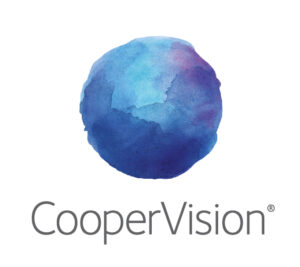


 With the Generous Support of our Donors in 2023:
With the Generous Support of our Donors in 2023: When people worry about necessities like food, shelter, and employment, their eye care often falls to the wayside. In North Carolina, 12% of the population lives in poverty and many are also uninsured. In Her Vision is dedicated to empowering women, children, LGBTQ+ and gender non-binary individuals in underserved communities to live their lives with confidence by providing access to basic vision services.
When people worry about necessities like food, shelter, and employment, their eye care often falls to the wayside. In North Carolina, 12% of the population lives in poverty and many are also uninsured. In Her Vision is dedicated to empowering women, children, LGBTQ+ and gender non-binary individuals in underserved communities to live their lives with confidence by providing access to basic vision services.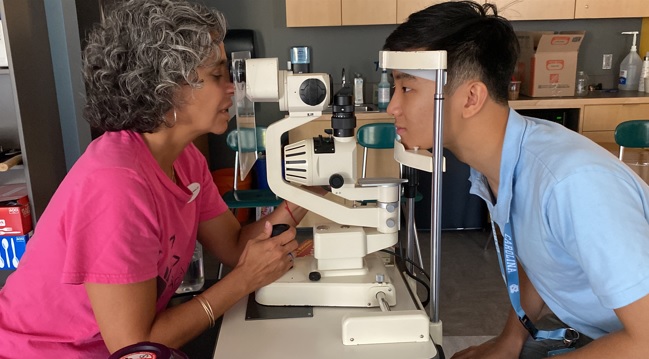
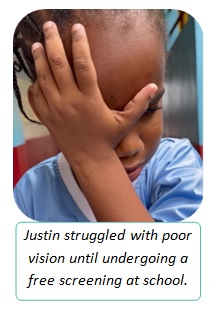
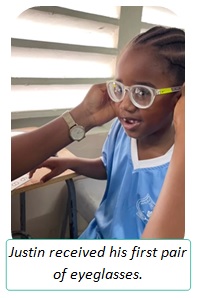 For six-year-old Justin success in school has not come easily. Significant vision impairment hampered his earlier efforts to succeed. For children like Justin who are unable to see clearly, the classroom is especially challenging. They struggle with written directions, reading comprehension, completing assignments and can have trouble staying focused in school. And, beyond the classroom, vision impairment can severely impact a child’s ability to interact with peers and participate in social and physical activities.
For six-year-old Justin success in school has not come easily. Significant vision impairment hampered his earlier efforts to succeed. For children like Justin who are unable to see clearly, the classroom is especially challenging. They struggle with written directions, reading comprehension, completing assignments and can have trouble staying focused in school. And, beyond the classroom, vision impairment can severely impact a child’s ability to interact with peers and participate in social and physical activities.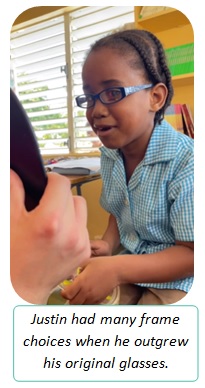
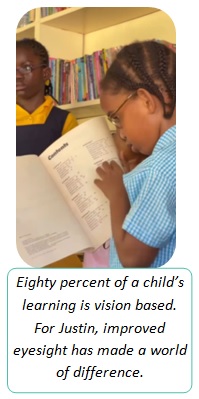 It is estimated that 80% of what children learn is visually-based. Good vision helps us navigate the world, allows us to learn by doing, enables us to make sense of what we experience around us, and improves our ability to engage with the world and others in it. Imagine how much Justin might have missed if he hadn’t received this initial vision screening.
It is estimated that 80% of what children learn is visually-based. Good vision helps us navigate the world, allows us to learn by doing, enables us to make sense of what we experience around us, and improves our ability to engage with the world and others in it. Imagine how much Justin might have missed if he hadn’t received this initial vision screening. Optometry Giving Sight (OGS) is pleased to announce that Sarah Burtner, M.A., has joined our staff as Director of Communications.
Optometry Giving Sight (OGS) is pleased to announce that Sarah Burtner, M.A., has joined our staff as Director of Communications.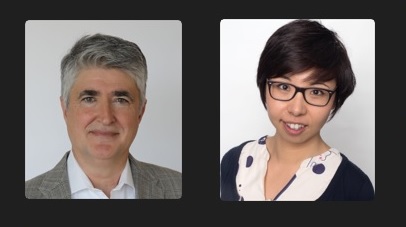 Optometry Giving Sight (OGS) announces the addition of Daniel McBride, executive vice president and chief operating officer of CooperCompanies, and Meng Meng Xu, OD, MPH, FAAO, to its board of directors.
Optometry Giving Sight (OGS) announces the addition of Daniel McBride, executive vice president and chief operating officer of CooperCompanies, and Meng Meng Xu, OD, MPH, FAAO, to its board of directors. With only a few weeks remaining, Optometry Giving Sight (OGS) has announced a $500,000 fundraising goal for its 2023 World Sight Day Challenge. Donations will fuel the organization’s efforts to help eradicate uncorrected refractive error through the growth and expansion of optometry around the world. As thousands of eye care professionals convene in New Orleans for Academy 2023 and observe World Sight Day, OGS calls upon the optometry community to help achieve this goal.
With only a few weeks remaining, Optometry Giving Sight (OGS) has announced a $500,000 fundraising goal for its 2023 World Sight Day Challenge. Donations will fuel the organization’s efforts to help eradicate uncorrected refractive error through the growth and expansion of optometry around the world. As thousands of eye care professionals convene in New Orleans for Academy 2023 and observe World Sight Day, OGS calls upon the optometry community to help achieve this goal.

